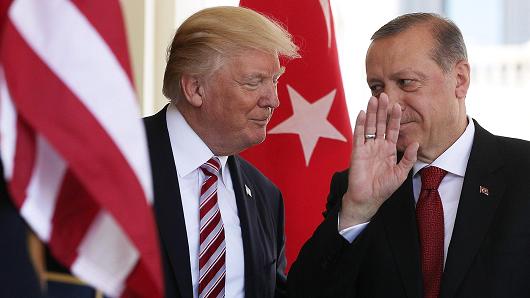Effective variables in Turkish – U.S. relations
Dr. Afshar Soleimani
Expert on international issues
With regard to the effective variables in Turkish – U.S. relations in recent months, Turkey’s irritation over the U.S. refusal to deliver Gülen, the leader of the Gülen movement (known as Hizmet meaning service in Turkish) to Turkey is worth mentioning. Mr. Erdogan believes that the coup last year was carried out by Gülen’s agents, and he frequently asked the United States for his delivery, while the U.S. government (neither Obama nor Tramp) had not delivered so far, and Turkey is upset about this. The second most notable variable is Turkey’s irritation over American support for the Syrian Democratic forces. Turkey is irritated by the fact that the United States supports the Kurdish forces that are part of the Syrian Democratic People’s Party, and defending forces known as PYD, used by the United States against ISIS, and has repeatedly requested that these supports not be carried out. But so far, the United States has not paid much attention to this issue. Turkey sees the link between the PKK and YPG and PYD, their territorial integrity in the future, and the PKK’s progress through Kurdish forces in the Mediterranean, as a threat for its territorial integrity, security and national interests.
Since 2013, after the failed coup, 150,000 people have been dismissed in Turkey; actions have been taken against the Gülenists, many of them have been arrested and imprisoned; these have been the subject of protest by the United States and Europeans, and have badly affected the relationship between them and Turkey. A referendum to change the constitution also sparked US and European criticism of Turkey’s performance. The set of these issues has been an effective variable in Turkish-American relations, but has not prevented their strategic relationship; Because Turkey is a member and one of the NATO bases and the United States needs Turkey in the region, and Turkey needs help from the United States. In addition, there are other factors which have a significant impact on Turkey’s relations with the United States, including Turkey’s relations with Russia, Iran with Israel and the Arab countries. But in sum, there are more parallels than conflicts between the two countries.
The type and quality of Turkish relations with Russia, Israel, Arab countries, Palestine and Iran can somehow affect the relations between Turkey and the United States. So that further development of Turkish-Russian relations and the crossing of the red lines will displease the US; as the United States will make Turkey feel annoyed in its relations with countries that are not aligned with Turkey. Finding a common point in all cases is impossible. The intersection of the interests of the United States and Turkey is in the interests of the West and the United States. In other words, with regard to the commitments made by NATO and the European Union, it must take steps in this direction, which, if not, will have an effect on relations between Turkey and the United States. Given the fact that US relations with the European Union also affect Turkey’s relations with the United States, if Turkey does not want to consider the EU, it will have a negative impact on US-Turkey relations. Although it is said that Trump is much less concerned about Europe than Obama and before him, the recent developments have shown that it is not and will not be.
Contexts for cooperation
Despite the discrepancies between Turkey and the United States, the most important of which are mentioned, there are also opportunities for cooperation, and perhaps somehow due to the geopolitical position of Turkey, the United States needs to cooperate with Turkey. As Turkey needs to improve its relations with the United States due to its problems, because the United States is prominent in the international system and has the most capabilities in the hierarchy of power. However, the United States cannot solve all the problems alone in the hierarchical multipolar International system. The United States has more potential to play than others, so Turkey needs the United States.
With regard to NATO and international institutions, Turkey needs US support. Despite the controversy between Turkey and the United States, both need to cooperate in regional affairs. Concerning the problems of Iraq and other countries in the region, the United States uses Turkey as a regional balance. Approaching Turkey and pushing it towards the countries of the region, or Turkey’s interest in establishing relations with them, is influential in the interests of Turkey and the United States.
Development of Turkey’s relations with countries like Russia will cause US dismay, but the other side of coin shows that the United States wants to use Turkey to influence its relations with other countries; So the two countries need mutual cooperation. However, in general, Turkey has placed itself in the capitalist system in development programs; as the United States is at the head of the world capitalist system, Turkey has to cooperate in attracting capital and technology from the United States. As has been done in the past, with the use of American capital and technology, large projects in Turkey are operational. All of these are very important. With regard to military technology, the US supports assembling factories in Turkey; The latest US military technology is being given to Turkey; Recently, a contract for the transfer of several F-35 fighter jets has been signed between Turkey and the United States which the same one has been delivered to Israel, while not every country has this kind of fighter jets. The total of these cases is the reason for the establishment of relations between Turkey and the United States. That is, differences between the two countries in a few cases will not create a problem in strategic relationships between them. Because the mutual needs between Turkey and the United States prevent serious the decline of relations between them unless there is an unpredictable incident inside Turkey that greatly transforms its foreign policy and Turkey pursues another foreign policy that is very unlikely.
Regarding the similarities of the Turkish-American positions in Syria and Iraq, it seems that there are no serious dissension between Turkey and the US, with the exception of the PKK issue, which created the disagreements between them in Syria. Turkey is more susceptible to YPG and PYD issues; if the United States considers Turkey’s concerns in this regard, it seems unlikely that there would be serious conflicts between them. There may be minor controversies, but there will be Turkish-American cooperation in Syria. Although Turkey cooperates with Russia and Iran, it is undoubtedly coordinating with the United States behind the scene. It’s the same in Iraq. There is no serious conflict between the two countries, and even Turkey is in some ways considered by the United States The United States does not want Iran to be an absolute actor there, which is not, of course. However, the Shiite Iran, which is allegedly a supporter of Shi’ites in the region, has actually caused the annoyance of Turkey and the United States. Therefore, the role of Iran in the formation of The Popular Mobilization Forces (PMF) in Iraq and now its presence there to fight ISIS has caused the sensitivities of the United States and Turkey. Because there is a consensus between the two countries about Iraq-both in the fight against ISIL and terrorism as well as in other domestic issues-if the United States supports more Turkey in its Kurdish problem, their Common political position and interests will increase.
What is clear is that Turkey, as a NATO member (NATO also has a military base there), is important for America and Europe. The interest of the United States in the role of Turkey in the Middle East in terms of aligning with the United States cannot be concealed; particularly, the sensitivities of the United States to Iran’s presence in the region have increased the US’s need for Turkey in the Middle East. Therefore, Turkey-US relations will increase in the future despite some disagreements; because their agreements and common interests are more than regional disputes. In other words, the mutual interests of the two countries are superior to their disputes, and this will create more relations between them. With the exception of the Kurdish problem and some of the disputes of Turkey with countries such as Saudi Arabia and Israel, there is no serious disagreement between Turkey and the United States in the region; but all these disagreements are not prioritized.
What is clear is the strategic consideration of the United States and Turkey over the region’s issues. Even the domestic issues of Turkey are affected by this fact. That is, Turkey sometimes does not pay attention to internal criticism against the West and the United States, because it is aware of the United States’ need for regional issues. Turkey knows that the United States and the West need the country in the region, which is why it somehow misuses this issue. The Turkish president raises his voice against the United States and the West because he thinks that they, especially the United States, have problems with Iran and there is extremism, so they need Turkey and have to deal with it.
** This article is originally published in Persian and translated by A.R. Mirjomehri.





